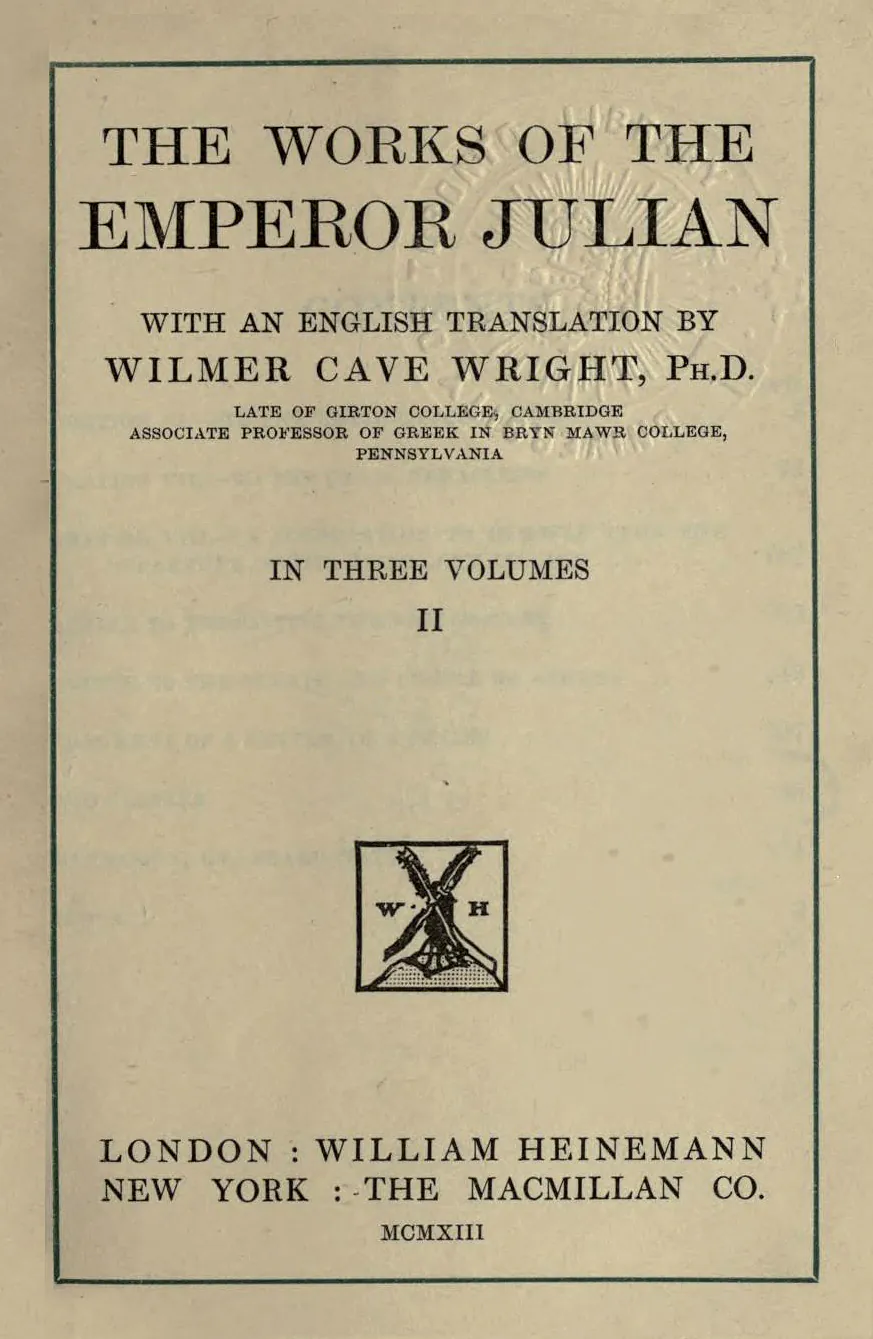[A]
σὺ δὲ ἀπεχθάνῃ τοῖς καπήλοις οὐ ξυγχωρῶν ὁπόσου βούλονται πωλεῖν αὐτοὺς1αὐτοὺς Reiske, αὐτοῖς Hertlein, MSS. τῷ δήμῳ τὰ ἐπιτήδεια καὶ τοῖς ἐπιδημοῦσιν. οἱ δὲ τοὺς κεκτημένους τὴν γῆν αἰτιῶνται. σὺ δὲ καὶ τούτους ἐχθροὺς ποιεῖ σαυτῷ τὰ δίκαια ποιεῖν ἀναγκάζων. οἱ δὲ ἐν τέλει τῆς πόλεως ἀμφοῖν μετέχοντες ταῖν ζημίαιν, ὥσπερ οἶιμαι πρότερον ἔχαριρον διχόθεν καρπούμενοι τὰς ὠφελείας,
[B]
καὶ ὡς κεκτημένοι καὶ ὡς καπηλεύοντες, τὰ νῦν εἰκότως λυποῦνται δι ̓ ἀμφοτέρων ἀφῃρημένοι τὰς ἐπικερδείας. ὁ δὲ τῶν Σύρων δῆμος οὐκ ἔχων μεθύειν οὐδὲ κορδακίζειν ἄχθεται. σὺ δὲ σῖτον ἄφθονον παρέχων οἴει τρέφειν αὐτοὺς ἱκανῶς. ἐκεῖνο δέ σου χαρίεν, ὅτι οὐδὲ ὅπως ἰχθὺς ἐν τῇ πόλει πετραῖος ἔσται σκοπεῖς· ἀλλὰ καὶ πρῴην μεμφομένου τινός, ὡς οὔτε ἰχθυδίων οὔτε ὀρνίθων πολλῶν εὑρισκομένων ἐν ἀγορᾷ,
[C]
τωθαστικὸν μάλα ἐγέλασας, ἄρτου καὶ οἴνου καὶ ἐλαίου τῇ σώφρονι πόλει δεῖν φάμενος, κρεῶν δ ̓ ἤδη τῇ τρυφώσῃ· τὸ γὰρ καὶ ἰχθύων καὶ ὀρνιθίων λόγον ποιεῖσθαι πέρα τρυφῆς εἶναι καὶ ἧς οὐδὲ τοῖς ἐν Ἰθάκῃ μνηστῆρσι μετῆν ἀσελγείας. ὅτῳ δὲ οὐκ ἐν ἡδονῇ κρέα ὕεια καὶ προβάτεια σιτεῖσθαι, τῶν ὀσπρίων ἁπτόμενος εὖ πράξει. ταῦτα ἐνόμισας Θρᾳξὶ νομοθετεῖν
[D]
τοῖς σεαυτοῦ πολίταις ἢ τοῖς ἀναισθήτοις Γαλάταις, οἵ σε ἐπαιδοτρίβησαν καθ ̓ ἡμῶν ‘πρίνινον, σφενδάμνινον,’ οὐκέτι μέντοι καὶ ‘Μαραθωνομάχον,’ ἀλλ ̓ Ἀχαρνέα μὲν ἐξ ἡμισείας, ἀηδῆ δ ̓ ἄνδρα παντάπασι καὶ ἄνθρωπον ἄχαριν. οὐ κρεῖττον ἦν ὀδωδέναι μύρων τὴν ἀγορὰν βαδίζοντός σου καὶ παῖδας ἡγεῖσθαι καλούς, εἰς οὓς ἀποβλέψουσιν οἱ πολῖται, καὶ χοροὺς γυναικῶν, ὁποῖοι παρ ̓ ἡμῖν ἵστανται καθ ̓ ἑκάστην ἡμέραν;”
[A]
But you are hated by the shopkeepers because you do not allow them to sell provisions to the common people and those who are visiting the city at a price as high as they please. The shopkeepers blame the landowners for the high prices; but you make these men also your enemies, by compelling them to do what is just. Again, those who hold office in the city are subject to both penalties; I mean that just as, before you came, they obviously used to enjoy profits from both sources,
[B]
both as landowners and as shopkeepers, so naturally they are now aggrieved on both accounts, since they have been robbed of their profits from both sources. Then the whole body of Syrian citizens are discontented because they cannot get drunk and dance the cordax.2The cordax was a lascivious dance. You, however, think that you are feeding them well enough if you provide them with plenty of corn. Another charming thing about you is that you do not even take care that the city shall have shell-fish. Nay more, when someone complained the other day that neither shell-fish nor much poultry could be found in the market,
[C]
you laughed very maliciously and said that a well-conducted city needs bread, wine and olive oil, but meat only when it is growing luxurious.3Plato, Republic 372 E. For you said that even to speak of fish and poultry is the extreme of luxury and of profligacy such as was beyond the reach of even the suitors in Ithaca; and that anyone who did not enjoy eating pork and mutton4The suitors of Penelope lived on pork and mutton. would fare very well if he took to vegetables.5Literally “pulse”. You must have thought that you were laying down these rules for Thracians,
[D]
your own fellow citizens, or for the uncultured people of Gaul who – so much the worse for us! – trained you to be ‘a heart of maple, a heart of oak,’ though not indeed ‘one who fought at Marathon’6Aristophanes, Acharnians 180 uses these words to describe the older, more robust generation of Athenians. also, but rather to be half of you an Acharnian and altogether an unpleasant person and an ungracious fellow. Would it not be better that the market place should be fragrant with myrrh when you walk there and that you should be followed by a troop of handsome boys at whom the citizens could stare, and by choruses of women like those that exhibit themselves every day in our city?”
EN translation: Wilmer Cave Wright, 1913
LEARN MORE
Place your mouse over a term to see corresponding popup from Wikipedia.
ALL PAGES

| Title | London: The Works of the Emperor Julian, Volume II/III |
| Publisher | London: William Heinemann |
| Year | 1913-23 |
| Pages | 416-511 pp. [vol. II: 538 pp.] |
| Translation | Wilmer Cave Wright. PhD |
| Editors | T.E. Page and W.H.D. Rouse |


